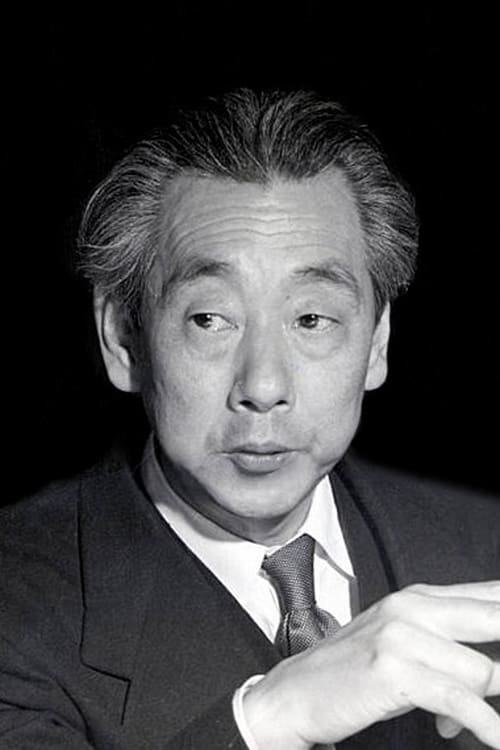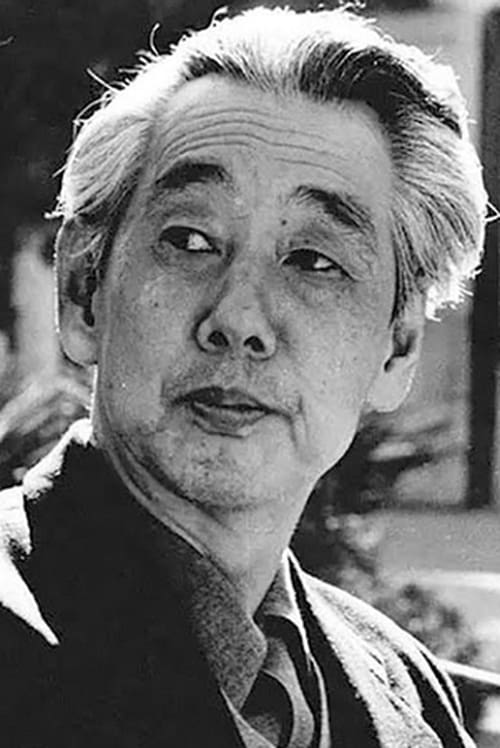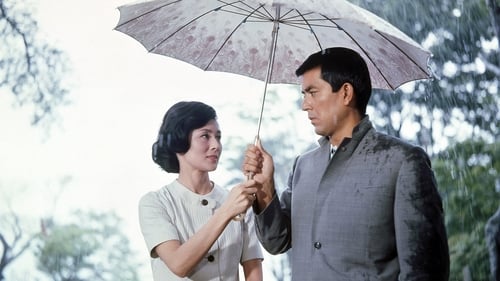
Director
임신 3개월인 유미코는 교통사고로 사랑하는 남편을 잃는다. 상심에 빠진 유미코는 과거를 잊기 위해 아이를 지우고, 아오모리로 옮겨 여관 일을 도우며 지낸다. 하지만 그곳에서 유미코는 남편을 죽인 미지마를 만나게 되는데, 그녀의 마음 속에서 증오와 연모의 감정이 어지럽게 교차하고, 유미코는 복잡한 감정에 휩싸이고 만다.

Director
When an only child is struck by a car and dies, the child's mother seeks vengeance against the driver in this thrilling drama. The car was driven by the wife of a company president who is having an affair. The woman's husband manages to buy silence about the incident, but the victim's mother discovers the identity of the driver. After she secures a job in the home of the company president and his philandering spouse, the woman plans to murder the couple's son when he reaches the age of her late son.

Director
친구인 스기모토와 다시로는 스기모토의 아내 사유리가 갑작스럽게 사고를 당했다는 소식을 듣는다. 스기모토는 처음엔 교통사고 정도로 생각했지만 더 심각한 범죄가 벌어졌다는 걸 곧 알게 되고, 아내가 지금까지 어떤 비밀을 숨기고 있었다는 것도 알게 된다. 한편 다시로 역시 이 사건과 어떤 연관이 있음이 드러난다. 에드워드 아티야의 범죄 소설 『가는 선』(1951)을 원작으로 한 작품
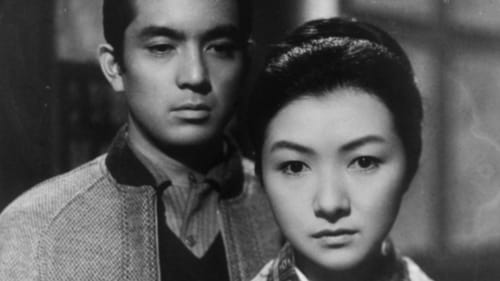
Story
전쟁 중에 남편을 잃은 레이코는 조그만 가게를 꾸리며 20년 가까이 늙은 시어머니를 비롯한 시댁 식구들을 돌보고 있다. 시동생 코지는 가게를 크게 키우고 그동안 고생한 레이코에게도 보답하고 싶지만 시누이들은 레이코가 집에서 떠나주길 바란다. 한편, 코지는 레이코에게 순수한 사랑을 고백하는데, 놀라면서도 마음이 흔들린 레이코는 집을 나가기로 한다.

Producer
전쟁 중에 남편을 잃은 레이코는 조그만 가게를 꾸리며 20년 가까이 늙은 시어머니를 비롯한 시댁 식구들을 돌보고 있다. 시동생 코지는 가게를 크게 키우고 그동안 고생한 레이코에게도 보답하고 싶지만 시누이들은 레이코가 집에서 떠나주길 바란다. 한편, 코지는 레이코에게 순수한 사랑을 고백하는데, 놀라면서도 마음이 흔들린 레이코는 집을 나가기로 한다.

Director
전쟁 중에 남편을 잃은 레이코는 조그만 가게를 꾸리며 20년 가까이 늙은 시어머니를 비롯한 시댁 식구들을 돌보고 있다. 시동생 코지는 가게를 크게 키우고 그동안 고생한 레이코에게도 보답하고 싶지만 시누이들은 레이코가 집에서 떠나주길 바란다. 한편, 코지는 레이코에게 순수한 사랑을 고백하는데, 놀라면서도 마음이 흔들린 레이코는 집을 나가기로 한다.

Director
A woman remember's her own marriage when dealing with the love life of her son.
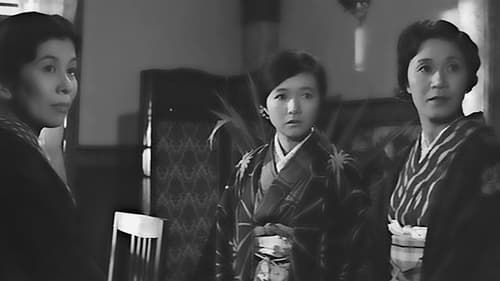
Producer
일자리를 찾던 가난한 후미코는 카페 `기린`에서 일하게 된다. 후미코는 자신이 쓴 시를 손님들에게 보여주기도 하는데, 그러던 중 한 남자가 그녀의 시를 칭찬하며 동인지의 일원이 되기를 권한다. 후미코는 그와 함께 카페를 떠나지만, 그녀의 생활은 순탄치 않다. 어느 날, 그녀의 작품 〈방랑기〉가 잡지에 실리고 후미코에게 새로운 인생이 열린다.

Director
일자리를 찾던 가난한 후미코는 카페 `기린`에서 일하게 된다. 후미코는 자신이 쓴 시를 손님들에게 보여주기도 하는데, 그러던 중 한 남자가 그녀의 시를 칭찬하며 동인지의 일원이 되기를 권한다. 후미코는 그와 함께 카페를 떠나지만, 그녀의 생활은 순탄치 않다. 어느 날, 그녀의 작품 〈방랑기〉가 잡지에 실리고 후미코에게 새로운 인생이 열린다.
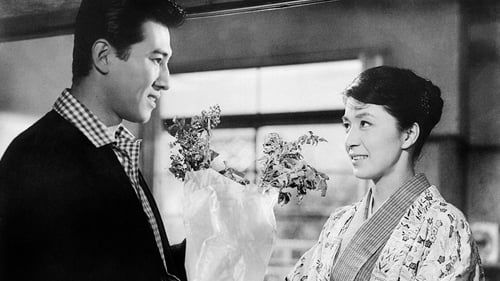
Director
Drama about the lives of the five daughters and daughter-in-law of a store owner.

Director
In "The Other Woman" the children of a distinguished professor find that the woman they have come to regard as their racy and slightly disreputable Ginza aunt is really their mother.
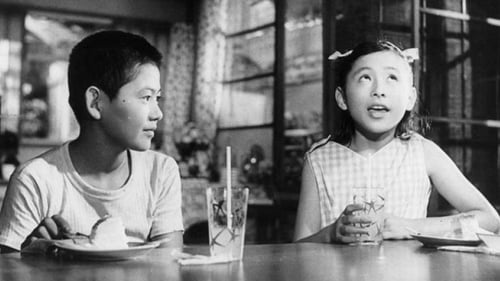
Producer
얼마 전 남편을 잃은 시게코는 어린 아들 히데오와 함께 오라버니의 집에서 살기로 한다. 그리고 작은 여관에서 일을 시작하며 새로운 생활에 적응하려 한다. 그런데 어느 날 친하게 지내던 여관 손님 도미오카와 사귄다는 소문이 돌면서 곤란한 입장에 처한다. 특히 아들 히데오의 입장을 생각하면 더욱 그렇다.

Director
얼마 전 남편을 잃은 시게코는 어린 아들 히데오와 함께 오라버니의 집에서 살기로 한다. 그리고 작은 여관에서 일을 시작하며 새로운 생활에 적응하려 한다. 그런데 어느 날 친하게 지내던 여관 손님 도미오카와 사귄다는 소문이 돌면서 곤란한 입장에 처한다. 특히 아들 히데오의 입장을 생각하면 더욱 그렇다.

Executive Producer
A woman and her daughter are in love with the same man, a chef at the restaurant that the mother manages. He is slightly crippled from frostbite in his years in Siberian labor camps and considers himself "already dead."

Director
A woman and her daughter are in love with the same man, a chef at the restaurant that the mother manages. He is slightly crippled from frostbite in his years in Siberian labor camps and considers himself "already dead."
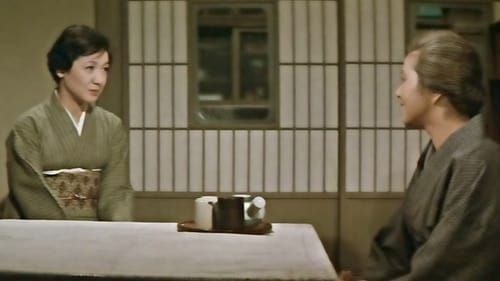
Director
딸이자 아내이자 엄마로 살아가야 하는 여성의 삶을 그린 영화. 장남 유이치로는 어머니와 동생들, 그리고 자식들을 보살펴야 한다는 책임감에 어깨가 무겁다. 그리고 이 책임은 유이치로의 아내인 가즈코에게 더욱 무겁게 다가온다.
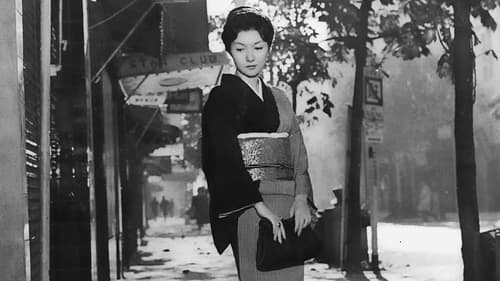
Director
교통사고로 남편을 잃은 게이코는 긴자의 고급 바에서 얼굴마담으로 일한다. 하지만 게이코는 수완이 좋지 않아 돈 많은 단골을 옛 동료의 가게에 빼앗기고, 사장은 매상이 좋지 않다며 게이코를 질책한다. 밝은 미래를 꿈꾸지만 뜻대로 되지 않아 절망에 빠진 게이코는 오늘도 하는 수 없이 손님을 맞기 위해 바의 계단을 오른다.
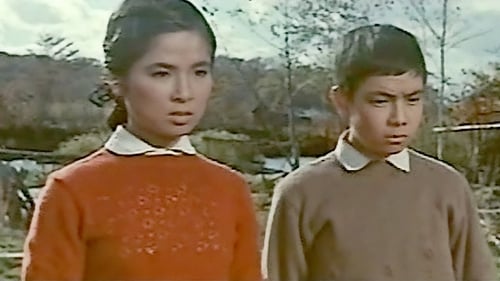
Director
The story is about the social problems faced by Japan's indigenous Ainu, mostly centered on the reactions of the characters to their oppressed state.
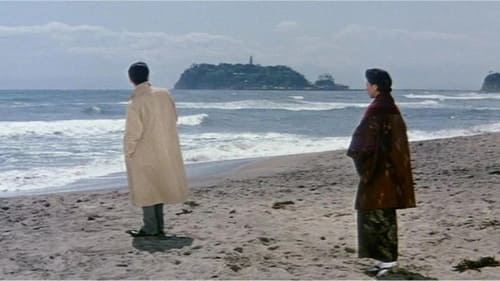
Director
전쟁 때문에 남편을 잃은 야에는 어린 아들을 키우며 시어머니와 함께 시골에서 농사를 지으며 살아가고 있다. 어느 날 야에는 신문 기자인 오카와와 취재를 계기로 가까워지고, 그에게 아내와 자식이 있다는 걸 알면서도 사랑의 감정을 느낀다. 나루세 미키오의 첫 번째 칼라 시네마스코프 영화.

Screenplay
Anzukko (Little Peach) is the daughter of a successful writer. She turns down each one of her suitors, until she marries a beginning writer named Ryokichi. Their life quickly sinks into despair.

Director
Anzukko (Little Peach) is the daughter of a successful writer. She turns down each one of her suitors, until she marries a beginning writer named Ryokichi. Their life quickly sinks into despair.
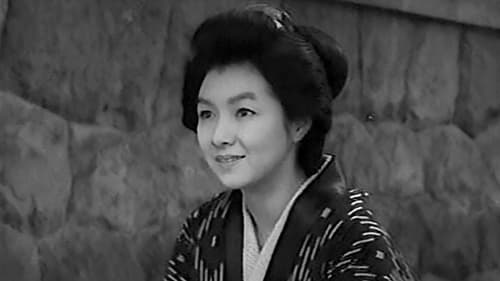
Director
어릴 때부터 생업전선에 뛰어든 뒤 몇 명의 남자들 사이에서 험난한 시간을 보낸 오시마의 삶을 그린 작품. 19살에 결혼한 오시마는 열심히 일하면서 행복하게 살려 하지만 바람기 많은 남편 때문에 마음 고생을 한다. 여기에 불운한 사고까지 겹치면서 오시마는 이혼을 하고 다른 마을로 팔려간다. 하지만 그녀는 끝까지 좌절하지 않고 계속해서 희망을 찾는다.
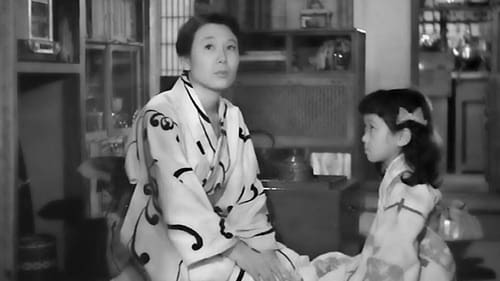
Director
츠타가 운영하는 야나기바시의 기생집. 어느 날, 남편과 아들을 잃은 리카가 직업소개소를 통해 일자리를 구하러 찾아온다. 츠타는 리카가 이름을 바꾸면 일을 할 수 있게 해주겠다고 하고, 리카는 이름을 ‘오하루’로 바꾼 후 식모살이를 시작한다. 힘들어도 온갖 허드렛일을 열심히 하던 오하루는 시장을 보러 갔다가 츠타의 기생집이 빚더미에 눌려 있음을 알게 된다. 쇠락한 기생집에서 생활하는 게이샤들의 애환을 당대 최고의 여배우들이 멋지게 연기해낸 작품이다. (2011년 시네마테크부산 - 나루세 미키오 특별전)

Director
Kiyoko (Takamine Hideko) and her husband want to open a coffee shop. She becomes increasingly close to the bank clerk (Mifune Toshiro) she's asked for a loan.
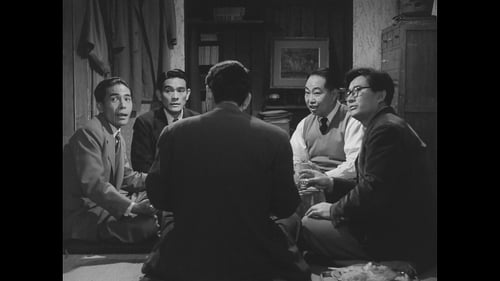
Director
료타로와 후미코 부부는 요즘 부쩍 다투는 일이 많아졌다. 아내가 읽지도 않은 신문의 요리란을 먼저 자르는 것이나, 남편이 혼자 주말에 외출하는 것 등 서로에게 서운함을 느끼는 일이 계속 벌어지는 것이다. 그런데 옆집에 젊은 부부인 넨키치와 히나코가 이사 오면서 자신들의 관계를 돌아볼 기회가 생긴다.

Executive Producer
Portmanteau film about young lovers.

Director
Portmanteau film about young lovers.
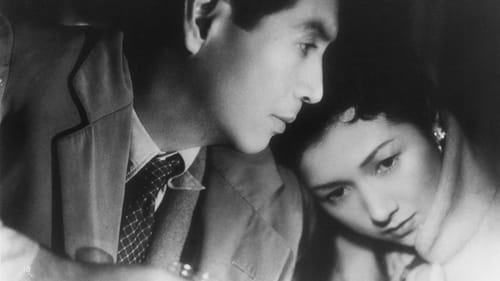
Director
태평양 전쟁 중에 도미오카를 만나 사랑에 빠진 유키코는 그가 이혼하고 자신과 살아갈 것이라고 생각한다. 그러나 그는 여전히 아내와 함께 살고 있었고, 유키코의 갑작스러운 방문에 놀란 도미오카는 집을 나와 온천이 있는 여관으로 그녀를 데려간다. 그리고 아내가 병이 들어 도저히 떠날 수 없다고 하는데...
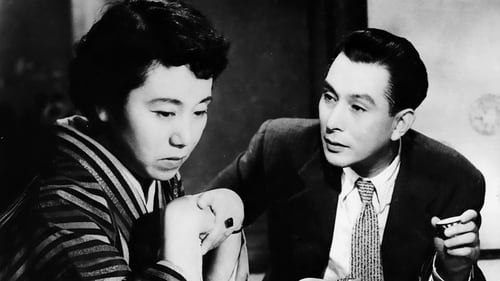
Director
구라하시 긴은 과거에 게이샤였지만 현재는 인근의 사람들에게 돈을 빌려주는 사채업자다. 그녀는 동경의 시타마치 지역의 안락한 집에서 귀먹어리 식모인 시즈코와 함께 살고 있다. 채무자들에게 악착같이 돈을 받아내는 것으로 악명 높은 그녀는 자주 불평과 비꼼을 당하기 일쑤다. 긴의 채무자들 중 한 명인 다마에는 그녀의 옛 게이샤 동료로 부유하고 나이 많은 여자와 어울리는 아들 기요시를 걱정한다. 이러한 '돈과 사랑 '이라는 주제는 긴의 옛사랑인 다베가 그녀를 찾아왔을 때 깊이를 더해간다. 긴은 다베가 찾아온 실제 목적을 알고는 씁쓸함을 맛본다. -서울시네마떼끄 나루세 미키오 회고전에서
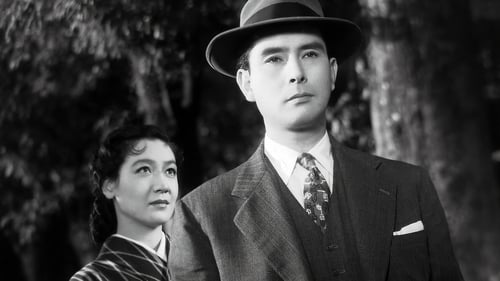
Director
동경의 성공한 사업가인 신고의 아들인 슈이치는 아내인 기쿠코, 부모님과 함께 카마쿠라의 안락한 집에서 살고 있다. 그는 아버지가 중견간부로 있는 회사에서 일하기 때문에 함께 직장에 출근한다. 그러나 슈이치는 자주 시내에 늦게까지 남아서 그의 정부와 함께 술을 마시며 지낸다. 기쿠코는 시부모를 돌보며 남편을 참을성 있게 기다리는데, 남편은 늦은 시간에 술에 취해 돌아오곤 한다. 현명하며 근대적인 사고를 가진 신고는 아들의 무분별함을 알지 못하며 외로운 며느리를 가엾게 여긴다. 거짓말하는데 지친 슈이치의 비서 에이코는 결국 신고에게 슈이치의 불륜을 말해주면서...

Director
식모살이를 하던 큰딸 몽이 임신을 하고 돌아오자, 아버지는 크게 언짢아 한다. 오빠 이노키치까지 홀몸이 아닌 그녀를 심하게 구박하자, 이를 견디지 못한 몽은 집을 나간다. 한편, 언니의 도움으로 간호학교에 다니던 상은 애인과의 결혼을 서두르지만 마음대로 되지 않는다.
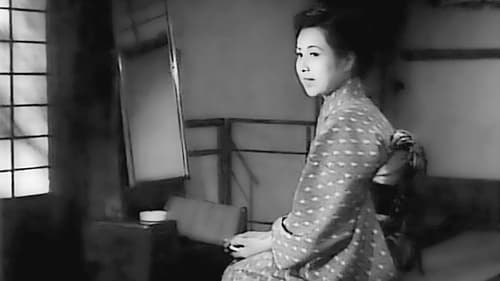
Director
결혼한 지 십 년이 지난 미호코와 나카가와 부부는 서로에게 무뚝뚝한 사이다. 그런데 최근 나카가와는 밝고 쾌활한 성격을 가진 비서 후사코와 많은 시간을 보낸다. 그런데 후사코가 고향에서 나카가와에게 보낸 엽서를 미호코가 먼저 발견하고 남편을 의심하기 시작하면서 일이 커진다. , 에 이은 ‘아내 이야기 3부작’ 중 마지막 작품.

Director
A married couple looking for an apartment move in with the husband's co-worker, a widower. The husband becomes jealous of the widower and his wife.
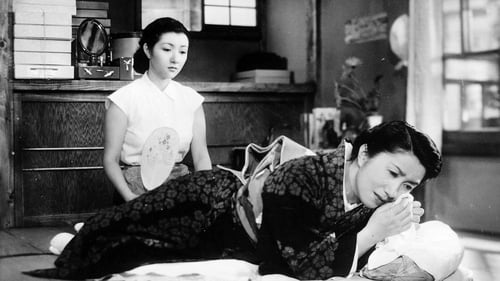
Director
관광버스 안내원을 하는 키요코의 가족은 도쿄의 서민 동네에 살고 있다. 오빠와 두 언니, 그리고 막내 키요코의 4형제는 모두 아버지가 달라서인지 다툼이 그치질 않는다. 지긋지긋하게 싸우는 가족들의 모습에 질린 키요코는 집을 나와 하숙을 시작하게 된다. 나루세 미키오 감독이 다이에이 영화사에서 찍은 최초의 영화로 익숙하지 않은 환경에서의 촬영이었으나, 가족들이 각자의 마음을 숨긴 채 소바를 먹는 장면은 나루세 미키오 특유의 시선극을 잘 보여준다. 20세기 중반 일본 영화의 황금기를 이끌었던 거장 나루세 미키오의 대표작
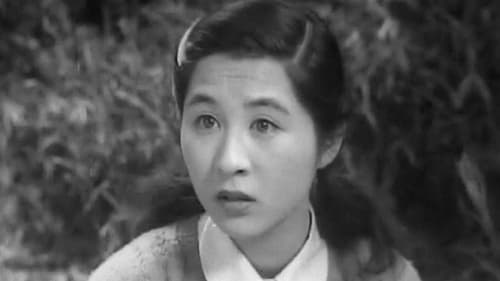
Director
료스케는 "뽀빠이" 타입의 아버지로 전쟁 때 폭격으로 불타버렸던 가게를 재건하고자 밤낮으로 열심히 일한다. 그의 아내인 마사코와 두 딸인 도시코와 히사코 또한 가족을 위해서 끝없이 희생하며 최선을 다해 돕는다. 도시코는 피카소에 영감을 받아 빵을 굽는 근대적인 사고를 사진 빵집의 신지로와 사랑하는 사이다. 어느 날 아버지는 병으로 눕게 되고 그의 형제인 기무라가 찾아온다. 그는 아버지에게 무슨 일이 일어나면 자신이 일을 돕겠다고 한다. 기무라는 모든 사람들과 잘 지내지만, 도시코는 사람들이 엄마와 기무라 간의 염문에 대해 수군거리는 소리를 듣게 된다. 이기심이 발동한 도시코는 기무라가 떠나야 한다고 주장하고 결국 기무라는 그렇게 하는데... (서울시네마떼끄 나루세 미키오 회고전)

Director
A high-born woman named Okuni travels around the country with Gohei, a samurai retainer who is in service to her. They are in search of Tomonojo, who has killed the man who was Okuni’s husband and Gohei’s master, and they cannot return to their lord’s home until they have fulfilled their duty of hunting down and killing Tomonojo.
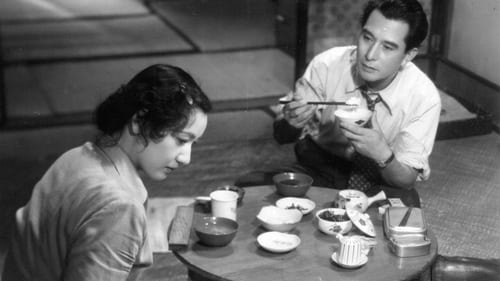
Director
결혼한 지 5년이 되어가는 미치요와 하쓰노스케는 점차 서로에게 권태를 느끼기 시작한다. 하쓰노스케는 작은 회사에서 증권 중개인으로, 미치요는 집안일을 하며 일상을 보낸다. 그러나 그들의 틀에 박힌 생활도 하쓰노스케의 조카인 사토코의 갑작스러운 방문으로 균열이 일어나는데...

Director
작가와 발레 선생인 아내의 관계는 수년 동안 다른 남자를 사랑해 오다가 결국 가족의 파탄으로 이어진다.
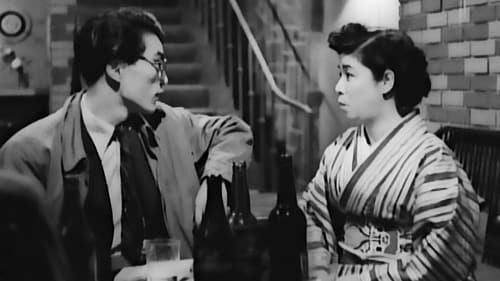
Director
긴자에 있는 술집 벨아미에서 일하는 유키코는 외아들 하루오와 함께 방을 얻고 씩씩하게 살고 있다. 옛날부터 친구였던 시즈에는 만사 돈이면 다 해결되리라고 생각하고 부자집 첩으로 살고 있었지만, 유키코는 이를 못내켜 한다. 어느 날 시즈에는 본인이 소개한 마을 부자집 차남, 이시카와가 상경하니 안내해달라고 유키코한테 부탁한다. 할 수 없이 안내역을 맡은 유키코였지만 이시카와의 순수하고 인간적인 성격을 보고 아련한 연정을 갖게 된다.

Director
A Japanese melodrama about three sisters, rival fashion companies, and attempted murder by overheated bathroom.
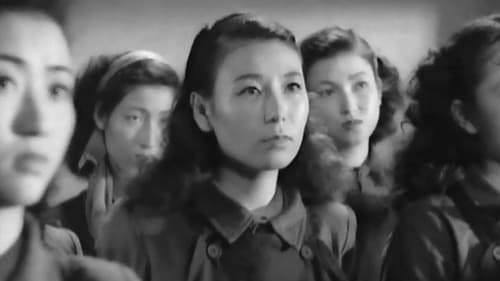
Writer
The critical establishment was clearly not prepared to accept a woman's prison film featuring former prostitutes recovering from venereal diseases, unwanted pregnancies, and estranged lovers. With its cat fights, hysterical tantrums, film noir lighting, and dramatic music, White Beast is indicative of the new influences of the Hollywood psychological thriller on Naruse. Caged (John Cromwell, 1950) initiated a cycle of women's prison movies in the United States that may or may not have been shown in Japan, but the stylistics of White Beast draw on the same paranoid woman's films and film noir conventions that preceded the American cycle.

Director
The critical establishment was clearly not prepared to accept a woman's prison film featuring former prostitutes recovering from venereal diseases, unwanted pregnancies, and estranged lovers. With its cat fights, hysterical tantrums, film noir lighting, and dramatic music, White Beast is indicative of the new influences of the Hollywood psychological thriller on Naruse. Caged (John Cromwell, 1950) initiated a cycle of women's prison movies in the United States that may or may not have been shown in Japan, but the stylistics of White Beast draw on the same paranoid woman's films and film noir conventions that preceded the American cycle.

Director
The Angry Street includes a great deal of location shooting in the rebuilt city, including downtown streets, residential neighborhoods, the campus of the University of Tokyo, and the high life of jazzy dance halls. Sudo (Hara Yasumi) and Mori (Uno Jukichi) are two university students who make money by picking up rich girls in dance clubs and conning them into giving them cash. Mori is the brains of the operation, and Sudo is the suave dancer who picks up the girls. Over the course of the film, Sudo becomes involved with three different girls and is drawn into the gangster milieu, which he seems unable to resist even though he is responsible for his mother, grandmother, and sister, Masako (Wakayama Setsuko). In this world of bad boys and girls, Masako is the pillar of strength and moral virtue who finally enables Mori to straighten out.

Screenplay
The Angry Street includes a great deal of location shooting in the rebuilt city, including downtown streets, residential neighborhoods, the campus of the University of Tokyo, and the high life of jazzy dance halls. Sudo (Hara Yasumi) and Mori (Uno Jukichi) are two university students who make money by picking up rich girls in dance clubs and conning them into giving them cash. Mori is the brains of the operation, and Sudo is the suave dancer who picks up the girls. Over the course of the film, Sudo becomes involved with three different girls and is drawn into the gangster milieu, which he seems unable to resist even though he is responsible for his mother, grandmother, and sister, Masako (Wakayama Setsuko). In this world of bad boys and girls, Masako is the pillar of strength and moral virtue who finally enables Mori to straighten out.
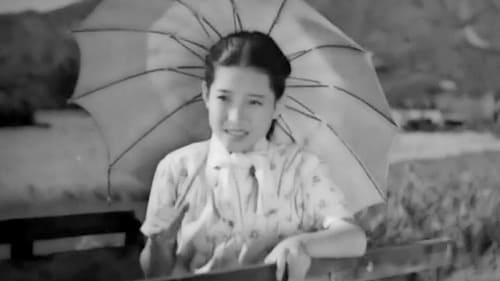
Director
Three humorous love stories set in rural Japan.

Director
"Delinquent Girl" - A melodramatic love story, a would-be apprenticeship between the titular “bad girl” and the optimistic scholar returning from the big city.

Screenplay
"Delinquent Girl" - A melodramatic love story, a would-be apprenticeship between the titular “bad girl” and the optimistic scholar returning from the big city.

Writer
Slice of life film centered around a couple of years in the life of a rural high school girl.

Director
Slice of life film centered around a couple of years in the life of a rural high school girl.

Director
Omnibus of love stories from 1947 directed by famous directors, featuring big stars.

Writer
A comedy about two salarymen who routinely degrade themselves for their boss.

Director
A comedy about two salarymen who routinely degrade themselves for their boss.

Director
Reputedly based on Frank Capra’s 1939 film Mr. Smith Goes to Washington, A Descendant of Tarô Urashima is about a repatriated soldier who becomes populist politician in the Japanese Happiness Party.

Director
에도 시대, 산주산겐도 사당에서 매년 개최하는 궁술 대회는 많은 이들의 관심의 대상이다. 다이하치로의 아버지는 이 궁술 대회에서 패배한 후 스스로 목숨을 끊었고, 다이하치로는 어릴 때부터 우승을 꿈꾸며 궁술을 갈고 닦는다. 하지만 최고의 실력자 간자에몽 등 어려운 장애물이 기다리고 있다. 나루세 미키오의 첫 사극 영화.
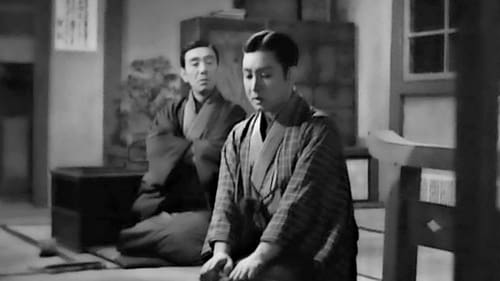
Director
The Way of Drama unfolds in the world of kabuki in Osaka, but also addresses the politics of popular culture and the rivalry between theatrical styles like those used by amateur actors to dramatise contemporary events.

Screenplay
A small community in wartime Japan learn how to make do with less.

Director
A small community in wartime Japan learn how to make do with less.

Director
야심만만한 젊은 노(能) 배우 기타하치는 여행 도중 유명한 배우인 소잔에 대한 이야기를 듣는다. 소잔에 대한 궁금증이 생긴 기타하치는 직접 그를 만나지만 그에게 큰 모욕을 주고 만다. 이 일로 기타하치는 스승이자 양아버지인 겐자부로와 사이가 나빠지고, 그로부터 2년이 지난 뒤 소잔의 딸에 대한 안타까운 소식을 듣는다.

Director
The premature death of a young mother serves as inspiration for her husband and son.
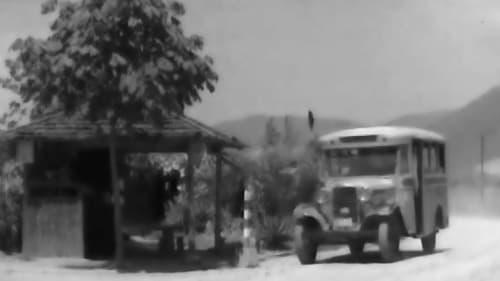
Writer
오코마는 작은 시골 마을의 낡은 버스에서 차장으로 일하고 있다. 그런데 최근 손님이 서서히 줄어들어 운전 기사인 소노다와 그녀는 일자리를 잃을 처지에 놓였다. 고심 끝에 오코마는 관광객들을 대상으로 관광지 안내 서비스를 기획하고, 마을의 소설가까지 끌어들여 새로운 시작을 하려 한다. 신인이었던 다카미네 히데코가 17살에 출연한 영화.

Director
오코마는 작은 시골 마을의 낡은 버스에서 차장으로 일하고 있다. 그런데 최근 손님이 서서히 줄어들어 운전 기사인 소노다와 그녀는 일자리를 잃을 처지에 놓였다. 고심 끝에 오코마는 관광객들을 대상으로 관광지 안내 서비스를 기획하고, 마을의 소설가까지 끌어들여 새로운 시작을 하려 한다. 신인이었던 다카미네 히데코가 17살에 출연한 영화.

Director
This movie is presumed to be lost.

Writer
A Fond Face from the Past is also set in a rural community, specifically a village outside Kameoka, near Kyoto. In some ways this short, thirty-six-minute film is Naruse's most moving negotiation of the militarist restrictions of the time, perhaps because it is also his most direct engagement with the culture of war. When a newsreel comes to Kameoka featuring a local man named Yoichi, it causes some excitement in the community and, of course, in Yoichi's own family. First of all his mother makes the newsreel (Nippon News, no. 14), which begins with the same marching music that opens his own film, followed by a curious baby judging context in Los Angeles featuring two hundred Japanese babies. Released in January 1941, almost a year before the pacific war begins, this “found footage” is indicative of Japanese imperialist ambitions beyond Asia long before Pearl Harbor.

Screenplay
A Fond Face from the Past is also set in a rural community, specifically a village outside Kameoka, near Kyoto. In some ways this short, thirty-six-minute film is Naruse's most moving negotiation of the militarist restrictions of the time, perhaps because it is also his most direct engagement with the culture of war. When a newsreel comes to Kameoka featuring a local man named Yoichi, it causes some excitement in the community and, of course, in Yoichi's own family. First of all his mother makes the newsreel (Nippon News, no. 14), which begins with the same marching music that opens his own film, followed by a curious baby judging context in Los Angeles featuring two hundred Japanese babies. Released in January 1941, almost a year before the pacific war begins, this “found footage” is indicative of Japanese imperialist ambitions beyond Asia long before Pearl Harbor.

Director
A Fond Face from the Past is also set in a rural community, specifically a village outside Kameoka, near Kyoto. In some ways this short, thirty-six-minute film is Naruse's most moving negotiation of the militarist restrictions of the time, perhaps because it is also his most direct engagement with the culture of war. When a newsreel comes to Kameoka featuring a local man named Yoichi, it causes some excitement in the community and, of course, in Yoichi's own family. First of all his mother makes the newsreel (Nippon News, no. 14), which begins with the same marching music that opens his own film, followed by a curious baby judging context in Los Angeles featuring two hundred Japanese babies. Released in January 1941, almost a year before the pacific war begins, this “found footage” is indicative of Japanese imperialist ambitions beyond Asia long before Pearl Harbor.

Screenplay
This film depicts a troupe of wandering kabuki players traveling through rural Japan.

Director
This film depicts a troupe of wandering kabuki players traveling through rural Japan.

Screenplay
9th directorial work by Yamamoto Satsuo.
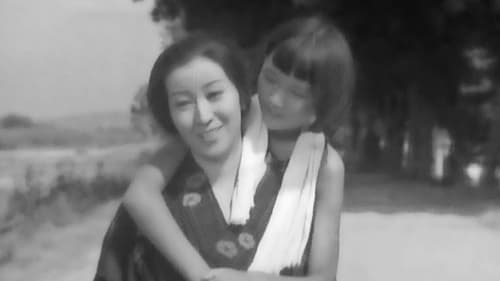
Writer
Two young girls, Nobiko and Tomiko, go to the same school. The less fortunate girl Nobiko is one of the top students, while the rich girl Tomiko is not. At one time Tomiko's father was quite fond of Nobuko's mother.

Director
Two young girls, Nobiko and Tomiko, go to the same school. The less fortunate girl Nobiko is one of the top students, while the rich girl Tomiko is not. At one time Tomiko's father was quite fond of Nobuko's mother.
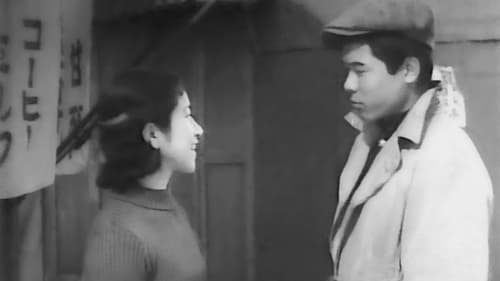
Screenplay
The Whole Family Works, Mikio Naruse's adaptation of a Sunao Tokunaga novel, feels more of a piece with the writer/director's quietly observant and psychologically charged later work. For the Naruse-familiar, it is an anomaly only in its placement within his filmography—indeed, this could be a film made by the elder, stasis-minded Naruse momentarily inhabiting, through a metaphysical twist of fate, his stylistically exuberant younger self. Set in depression-era Japan around the time of the Sino-Japanese War (which the director evokes, during a brief dream sequence, by dissolving between children's war games and actual adult warfare), The Whole Family Works gently observes a family coming apart at the seams. Ishimura (Musei Tokugawa) is the jobless father of nine children.

Director
The Whole Family Works, Mikio Naruse's adaptation of a Sunao Tokunaga novel, feels more of a piece with the writer/director's quietly observant and psychologically charged later work. For the Naruse-familiar, it is an anomaly only in its placement within his filmography—indeed, this could be a film made by the elder, stasis-minded Naruse momentarily inhabiting, through a metaphysical twist of fate, his stylistically exuberant younger self. Set in depression-era Japan around the time of the Sino-Japanese War (which the director evokes, during a brief dream sequence, by dissolving between children's war games and actual adult warfare), The Whole Family Works gently observes a family coming apart at the seams. Ishimura (Musei Tokugawa) is the jobless father of nine children.

Screenplay
Drama about a couple and how they found themselves related with music, their egos and each other.

Director
Drama about a couple and how they found themselves related with music, their egos and each other.
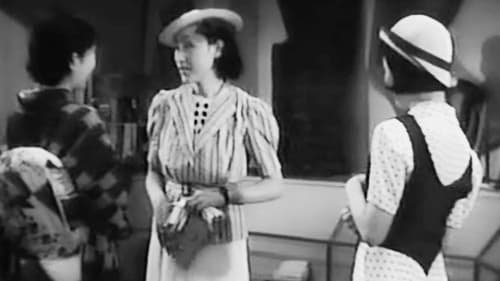
Director
Part 2 of a 2-part romance (fist part - Kafuku zempen) based on a story by noted author Kikuchi Kan. In the second half, we discover that Toyomi is pregnant -- and while Shintaro and Yurie are on their extended honeymoon, she bears his child, a girl named Kiyoko. She is supported in adversity by Michiko -- and gets considerable moral support from not only her own mother but also from Shintaro's mother and siblings. Even more surprisingly, Yurie strikes up a friendship of sorts with her. When Yurie learns that the child is Shintaro's, she convinces Toyomi that it would be best to let Shintaro (and her) raise Kiyoko, so Toyomi can get on with making a proper life for herself. Tearfully, Toyomi agrees. Sometime later, Michiko goes to visit Toyomi -- and sees her at work, as a kindergarten teacher.
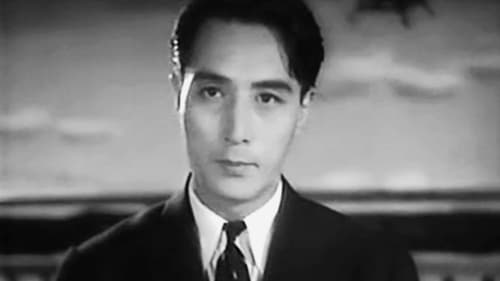
Director
Part 1 of a 2-part romance based on a story by noted author Kikuchi Kan. The central character here is Toyomi (played by Takako IRIE, star of Mizoguchi’s "Water Magician), a rich young woman in love with Shintaro (Minoru TAKADA), a rich young man. Unfortunately, Shintaro’s father is in the process of arranging a marriage for him with Yurie (Chieko TAKEHISA), the scion of an even wealthier family. In order to avoid this, the two young lovers flee to Tokyo to live together. When Shintaro comes back to proclaim his intent to marry Toyomi, his father browbeats him into attending the long-arranged marriage meeting with Yurie. While Shintaro is back home, Toyomi goes on a vacation trip with her closest chum, Michiko (Yumeko AIZOME). At a class reunion, Toyomi is to distressed (at not having heard from Shintaro for so long), she doesn’t go out on the town with her classmates. Michiko, however, runs into Shintaro and Yurie (also out on the town), and pulling him aside, demands an explanation.

Screenplay
The study of a one-year marriage that begins to crumble. A married man is torn between the love of his wife, and the attraction to a cousin of his wife.

Director
The study of a one-year marriage that begins to crumble. A married man is torn between the love of his wife, and the attraction to a cousin of his wife.

Story
주체적으로 변하는 여인의 모습을 담았다

Screenplay
주체적으로 변하는 여인의 모습을 담았다

Director
주체적으로 변하는 여인의 모습을 담았다
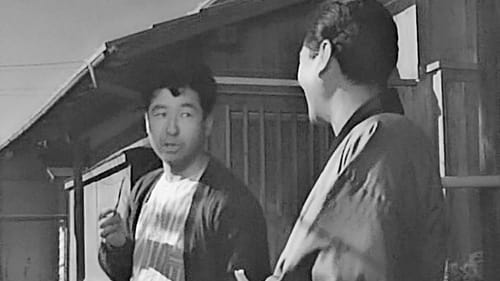
Writer
As suggested by the title, this film takes up the theme of the city, beginning with a series of traveling shots from Chiyo's point o view on a bus leaving the countryside and entering the metropolitan cityscape. After some fruitless job hunting in downtown Tokyo, Chiyo accepts a job as a bar hostess in Shiba ward. Well away from glamorous Asakusa and Ginza, this is a neighborhood bar where the women are dirt poor, each having only one kimono to their name....

Director
As suggested by the title, this film takes up the theme of the city, beginning with a series of traveling shots from Chiyo's point o view on a bus leaving the countryside and entering the metropolitan cityscape. After some fruitless job hunting in downtown Tokyo, Chiyo accepts a job as a bar hostess in Shiba ward. Well away from glamorous Asakusa and Ginza, this is a neighborhood bar where the women are dirt poor, each having only one kimono to their name....
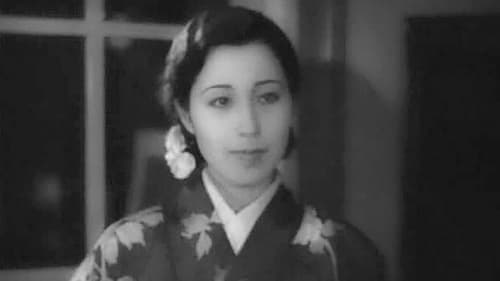
Writer
The otherwise promising young man Asaji (Heihachirô Ôkawa) and his younger brother Yuji (Hideo Saeki) face blighted lives because of society's disapproval of their illegitmacy and déclassé family.

Director
The otherwise promising young man Asaji (Heihachirô Ôkawa) and his younger brother Yuji (Hideo Saeki) face blighted lives because of society's disapproval of their illegitmacy and déclassé family.

Writer
This film is based on a real Meiji era performer -- and tells of Tochuken's partnership with his wife (played by Chikako Hosokawa) who played shamisen for his songs/recitations), his affair with a geisha (Sachiko Chiba), and the deterioration of his partnership and marriage.

Director
This film is based on a real Meiji era performer -- and tells of Tochuken's partnership with his wife (played by Chikako Hosokawa) who played shamisen for his songs/recitations), his affair with a geisha (Sachiko Chiba), and the deterioration of his partnership and marriage.

Screenplay
A story of two sisters, the older being more traditional, the younger a "moga" ("modern girl"). Their widowed father runs the family sake shop, but is running into financial trouble, causing him to tamper with his stock; Meanwhile, his long-time mistress yearns for something more serious. Amidst this, the older sister is introduced to a well-off suitor: A university boy, much more intrigued by the less traditional little sister. A doddering grandfather, an officious uncle and busybody neighbors also don't make the lives of the hardworking members of the family any easier.

Director
A story of two sisters, the older being more traditional, the younger a "moga" ("modern girl"). Their widowed father runs the family sake shop, but is running into financial trouble, causing him to tamper with his stock; Meanwhile, his long-time mistress yearns for something more serious. Amidst this, the older sister is introduced to a well-off suitor: A university boy, much more intrigued by the less traditional little sister. A doddering grandfather, an officious uncle and busybody neighbors also don't make the lives of the hardworking members of the family any easier.
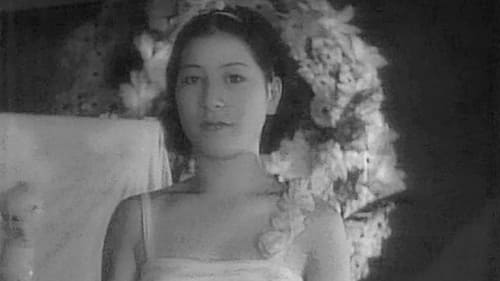
Director
The main focus is on the 5 member band of a small circus as it runs into problems while touring rural Japan. It also pays lots of attention to the two daughters of the aging and irascible ringmaster-circus owner. The high points are the sound (and score) and cinematography featuring a lot of vertiginous panning (appropriate - as high wire trapeze artists are also an important element in the film). A fascinating side-light on 30s Japan.
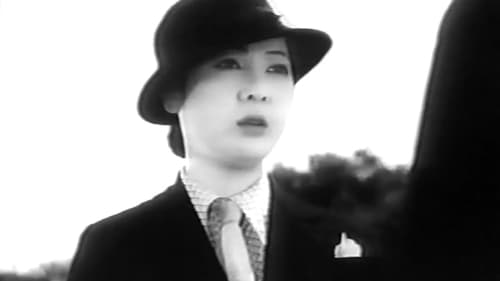
Writer
아버지가 집을 나간 후 키미코는 어머니와 단둘이 살고 있다. 키미코는 아버지를 되찾기 위해 산골 마을을 찾아가지만, 아버지는 이미 전직 게이샤 오유키와 동거하고 있다.

Director
아버지가 집을 나간 후 키미코는 어머니와 단둘이 살고 있다. 키미코는 아버지를 되찾기 위해 산골 마을을 찾아가지만, 아버지는 이미 전직 게이샤 오유키와 동거하고 있다.

Director
Among the tight-knit neighbours are a poet, his actress wife, a bachelor budding author, a tobacco shop owner-cum-landlady, an insurance salesman and his nosy and greedy wife. Enter a young and seemingly high-class couple who just so happens is open to purchasing life insurance from their swift neighbour. In the meantime, life is imitating art across the street, which may end up providing for either a happy ending or a rude split - eventually that is.

Adaptation
술집을 전전하며 샤미센을 연주하는 오소메, 클럽 댄서인 치에코, 그리고 건달을 애인으로 둔 오렌의 이야기를 그린 영화. 오렌은 최근 사고를 치고 도망간 애인을 숨겨주고 있다. 하지만 이 사실을 오소메가 알면서 세 자매는 곤란한 입장에 처한다. 나루세 미키오가 연출한 첫 유성 영화.
(2015 한국시네마테크협의회 - 나루세 미키오 특별전)

Director
술집을 전전하며 샤미센을 연주하는 오소메, 클럽 댄서인 치에코, 그리고 건달을 애인으로 둔 오렌의 이야기를 그린 영화. 오렌은 최근 사고를 치고 도망간 애인을 숨겨주고 있다. 하지만 이 사실을 오소메가 알면서 세 자매는 곤란한 입장에 처한다. 나루세 미키오가 연출한 첫 유성 영화.
(2015 한국시네마테크협의회 - 나루세 미키오 특별전)
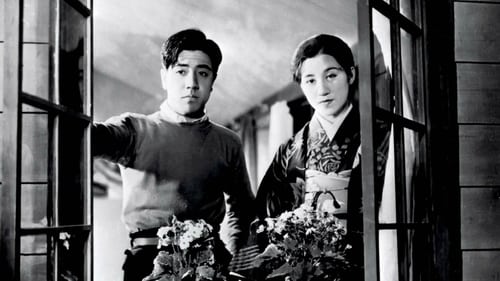
Director
Mikio Naruse’s final silent film is a gloriously rich portrait of a waitress, Sugiko, whose life, despite a host of male admirers and even some intrigued movie talent scouts, ends up taking a suffocatingly domestic turn after a wealthy businessman accidentally hits her with his car.
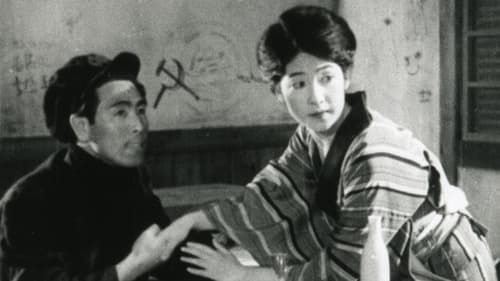
Story
In the formally ravishing Every-Night Dreams, set in the dockside neighborhoods of Tokyo, a single mother works tirelessly as a Ginza bar hostess to ensure a better life for her young son—until her long-lost husband returns.

Director
In the formally ravishing Every-Night Dreams, set in the dockside neighborhoods of Tokyo, a single mother works tirelessly as a Ginza bar hostess to ensure a better life for her young son—until her long-lost husband returns.
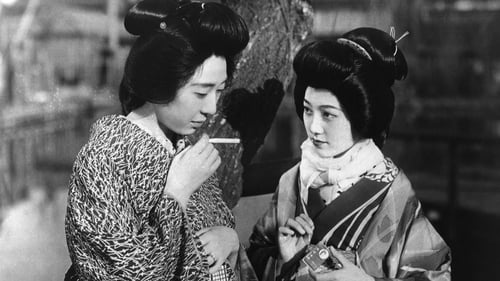
Screenplay
키쿠에는 자신을 희생해서 아들 요시오를 홀로 키우지만 요시오는 언제부터인가 게이샤인 어머니를 부끄러워하며 나쁜 무리들과 어울리기 시작한다. 그를 사랑하는 아름다운 게이샤 테루기쿠는 갱 멤버로부터 그를 구출한다. 그러나 부모의 가난으로 자신의 누이동생이 팔려 갈 운명에 처하자 돈을 벌기 위해 그의 곁을 떠난다.

Director
키쿠에는 자신을 희생해서 아들 요시오를 홀로 키우지만 요시오는 언제부터인가 게이샤인 어머니를 부끄러워하며 나쁜 무리들과 어울리기 시작한다. 그를 사랑하는 아름다운 게이샤 테루기쿠는 갱 멤버로부터 그를 구출한다. 그러나 부모의 가난으로 자신의 누이동생이 팔려 갈 운명에 처하자 돈을 벌기 위해 그의 곁을 떠난다.
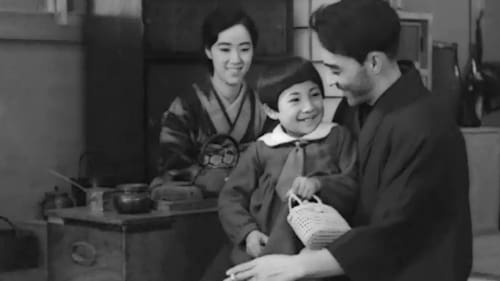
Writer
An actress returns to Tokyo after a successful stint in Hollywood to reclaim—with the help of her gangster brother—the daughter she abandoned years before.

Director
An actress returns to Tokyo after a successful stint in Hollywood to reclaim—with the help of her gangster brother—the daughter she abandoned years before.

Director

Writer
Kato's splendid mustache is an obstacle when it comes to finding a job. However, he gets a job as a security guard at a construction site. The president of the construction company tries to grow a mustache like Kato's and, failing, orders Kato to shave off his.

Director
Kato's splendid mustache is an obstacle when it comes to finding a job. However, he gets a job as a security guard at a construction site. The president of the construction company tries to grow a mustache like Kato's and, failing, orders Kato to shave off his.

Screenplay
A short concerning an impoverished insurance salesman and his scrappy son, whose fisticuffs with the other boys of their village put his father’s livelihood in jeopardy.

Director
A short concerning an impoverished insurance salesman and his scrappy son, whose fisticuffs with the other boys of their village put his father’s livelihood in jeopardy.

Original Story

Director

Director
Silent comedic short by Mikio Naruse
